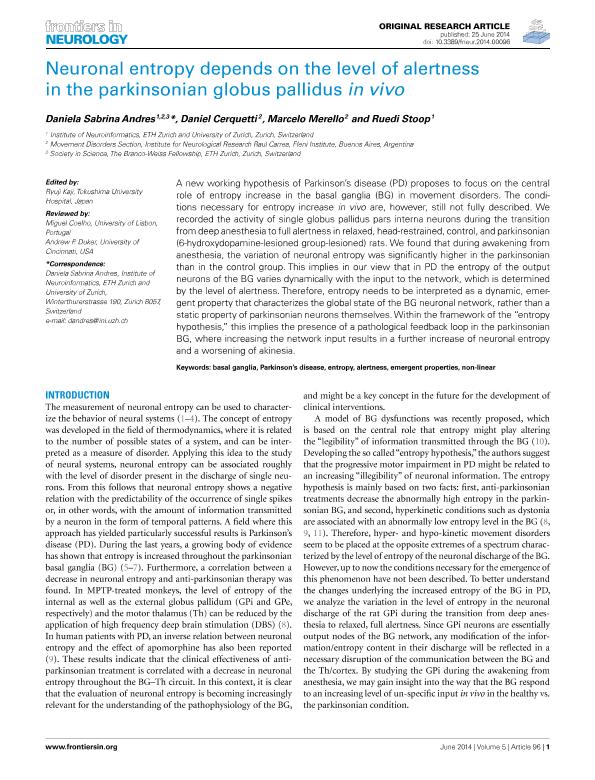Mostrar el registro sencillo del ítem
dc.contributor.author
Andres, Daniela Sabrina

dc.contributor.author
Cerquetti, Daniel

dc.contributor.author
Merello, Marcelo Jorge

dc.contributor.author
Stoop, Ruedi
dc.date.available
2018-03-09T21:04:45Z
dc.date.issued
2014-06
dc.identifier.citation
Andres, Daniela Sabrina; Cerquetti, Daniel; Merello, Marcelo Jorge; Stoop, Ruedi; Neuronal entropy depends on the level of alertness in the parkinsonian globus pallidus in vivo; Frontiers; Frontiers in Neurology; 5; 6-2014; 1-9; 96
dc.identifier.issn
1664-2295
dc.identifier.uri
http://hdl.handle.net/11336/38499
dc.description.abstract
A new working hypothesis of Parkinson's disease (PD) proposes to focus on the central role of entropy increase in the basal ganglia (BG) in movement disorders. The conditions necessary for entropy increase in vivo are, however, still not fully described. We recorded the activity of single globus pallidus pars interna neurons during the transition from deep anesthesia to full alertness in relaxed, head-restrained, control, and parkinsonian (6-hydroxydopamine-lesioned group-lesioned) rats. We found that during awakening from anesthesia, the variation of neuronal entropy was significantly higher in the parkinsonian than in the control group. This implies in our view that in PD the entropy of the output neurons of the BG varies dynamically with the input to the network, which is determined by the level of alertness. Therefore, entropy needs to be interpreted as a dynamic, emergent property that characterizes the global state of the BG neuronal network, rather than a static property of parkinsonian neurons themselves. Within the framework of the "entropy hypothesis," this implies the presence of a pathological feedback loop in the parkinsonian BG, where increasing the network input results in a further increase of neuronal entropy and a worsening of akinesia.
dc.format
application/pdf
dc.language.iso
eng
dc.publisher
Frontiers

dc.rights
info:eu-repo/semantics/openAccess
dc.rights.uri
https://creativecommons.org/licenses/by-nc-sa/2.5/ar/
dc.subject
Alertness
dc.subject
Basal Ganglia
dc.subject
Emergent Properties
dc.subject
Entropy
dc.subject
Non-Linear
dc.subject
Parkinson'S Disease
dc.subject.classification
Neurociencias

dc.subject.classification
Medicina Básica

dc.subject.classification
CIENCIAS MÉDICAS Y DE LA SALUD

dc.subject.classification
Otras Ciencias Físicas

dc.subject.classification
Ciencias Físicas

dc.subject.classification
CIENCIAS NATURALES Y EXACTAS

dc.subject.classification
Fisiología

dc.subject.classification
Medicina Básica

dc.subject.classification
CIENCIAS MÉDICAS Y DE LA SALUD

dc.title
Neuronal entropy depends on the level of alertness in the parkinsonian globus pallidus in vivo
dc.type
info:eu-repo/semantics/article
dc.type
info:ar-repo/semantics/artículo
dc.type
info:eu-repo/semantics/publishedVersion
dc.date.updated
2018-03-09T18:59:56Z
dc.journal.volume
5
dc.journal.pagination
1-9; 96
dc.journal.pais
Suiza

dc.description.fil
Fil: Andres, Daniela Sabrina. Universitat Zurich; Suiza. Fundación para la Lucha Contra las Enfermedades Neurológicas de la Infancia. Instituto de Investigaciones Neurológicas ; Argentina. Consejo Nacional de Investigaciones Científicas y Técnicas; Argentina
dc.description.fil
Fil: Cerquetti, Daniel. Fundación para la Lucha Contra las Enfermedades Neurológicas de la Infancia. Instituto de Investigaciones Neurológicas ; Argentina
dc.description.fil
Fil: Merello, Marcelo Jorge. Fundación para la Lucha Contra las Enfermedades Neurológicas de la Infancia. Instituto de Investigaciones Neurológicas ; Argentina. Consejo Nacional de Investigaciones Científicas y Técnicas; Argentina
dc.description.fil
Fil: Stoop, Ruedi. Universitat Zurich; Suiza
dc.journal.title
Frontiers in Neurology
dc.relation.alternativeid
info:eu-repo/semantics/altIdentifier/doi/http://dx.doi.org/10.3389/fneur.2014.00096
dc.relation.alternativeid
info:eu-repo/semantics/altIdentifier/url/https://www.frontiersin.org/articles/10.3389/fneur.2014.00096/full
Archivos asociados
